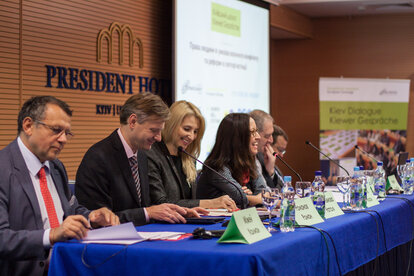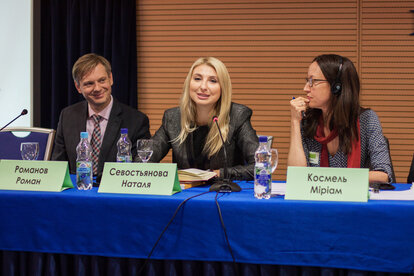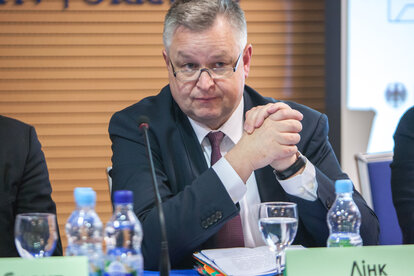11th Kiev Dialogue: Human Rights under Military Conflict and Justice Reforms
Reform in the core areas of justice and fundamental rights – how are they to be assessed one-and-a-half years after the Revolution of Dignity, supposedly ending selective justice and guaranteeing respect for the rule of law in Ukraine?
Following an established tradition by now, Friedrich Naumann Foundation for Freedom again supported this year’s 11th Kyiv Dialogue, a platform established in the winter of 2004/2005 to provide for regular exchange and cooperation between Ukrainian and German civil society and an annual conference on topics of current importance alternating between Kyiv and Berlin. This year’s topic “Between Crisis and Reforms: Human Rights and Justice in Ukraine” was chosen to reflect what is at present a major concern for many Ukrainians’ daily life and Ukrainian politics alike.

Panel III participants with Kálmán Miszei, Head of the EU Advisory Mission on Civilian Security Sector Reform
Friedrich Naumann Foundation supported Panel III, Constitutional Reform as the Cornerstone for Reform of the Judiciary and Fundamental Rights. Kálmán Miszei, Head of the EU Advisory Mission on Civilian Security Sector Reform, Natalia Sevostianova, First Deputy Minister of Justice of Ukraine, Yevgeny Zakharov, Head of the Ukrainian Helsinki Human Rights Union and Director of the Kharkiv Human Rights Protection Group, Gennady Ryshkov, Legal Expert with the German Foundation for International Legal Cooperation and Roman Romanov, Program Director for Human Rights and Justice at the International Renaissance Foundation of the Open Society Institute network all discussed a series of amendments pertaining to the judiciary system, including the prosecution and law enforcement.
These questions are most acute at a time when President Poroshenko, at the inaugural meeting of yet another new prevention body, the Council on Anti-Corruption Policy, articulates “great hopes for upcoming court reforms”, while on the other end of the spectrum Parliament’s case for firing the incumbent General Prosecutor gains momentum.
Miszei, referring back to 2004 when he initiated the so-called Blue Ribbon Commission recommending far-reaching structural reforms to the then-new administration in Ukraine – like reforming the judicial system to make judges independent and impartial –, pointed out still existing deficiencies, particularly human rights violations in criminal cases, but also recalled Ukraine’s extremely difficult past and underlined the “dignified self-organisation” of Ukrainians as potential for change and reforms to take effect in the long run.
Vice-Minister Sevostianova stated that there was “a hundred percent political will” to fire judges or prosecutors obstructive to reform, a statement challenged later on by listeners from the audience who pointed to an open fight between reformers and recidivists.

Roman Romanov (Program Director for Human Rights and Justice at the IRF), Vice-Minister Natalia Sevostianova (First Deputy Minister of Justice of Ukraine) and Miriam Kosmehl (Project Director in Ukraine, Friedrich Naumann Foundation for Freedom)
Zakharov strongly opposed the “style” of current reforms that he called “over-politicised” and too “closed” and “sporadic”. Nevertheless, he underlined successes in following-up on and decreasing human rights violations like illegal detentions or torture.
Ryshkov criticised that young qualified new professionals often ended up stuck in old administrative structures that do not use their talent appropriately.
Romanov as one of the creators of a pro bono legal aid centre for defendants that is keeping prosecutors in check underlined the crucial importance of access to justice.
Altogether, the panel, followed by a question and answer session with the listeners, whom the panel regrettably did not completely satisfy due to the amount of questions and comments put forward by the engaged audience, painted a rather bleak picture of the current situation. At the same time, the status quo was judged to be much better compared with that under ex-president Yanukovych, with authorities being more sensitive to criticism or more vulnerable – and at any rate both making it easier for domestic and foreign players to have an impact when pushing reforms forward.
While the session only superficially touched upon crucial topics of judicial reform and fundamental and human rights, almost all participating panel speakers continued to be available in the course of specific working groups in the afternoon that targeted specific issues like the right to a fair trial, reforming law enforcement and human rights in criminal proceedings or constitutional reform.

Michael Link, OSCE ODIHR Director, summarised specific recommendations to improve the human rights situation in Ukraine, including the Crimean peninsula.
A closing panel in the evening with Michael Link, Director of the OSCE’s Office for Human Rights and Democratisation, Yevgeniy Zakharov, Rebecca Harms, MEP, Johannes Regenbrecht, Head of the Task Force Ukraine in the German Foreign Office and Evhen Bystrytskyy, Director International Renaissance Foundation collected specific recommendations for ameliorations in the sphere of fundamental and human rights in all of Ukraine, including Crimea.
For more information please visit the website of FNF Ukraine and Belarus.